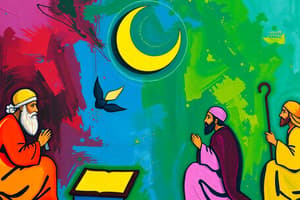Podcast
Questions and Answers
According to Islamic teachings, acts of kindness are equivalent to:
According to Islamic teachings, acts of kindness are equivalent to:
- Reciting the Qur'an
- Charity (correct)
- Fasting
- Zakat
During the month of Ramadan, Muslims are encouraged to:
During the month of Ramadan, Muslims are encouraged to:
- Focus solely on spiritual growth
- Increase their generosity through donations and volunteering (correct)
- Abstain from all acts of kindness
- Engage in physical fitness activities
Which of the following is NOT considered an act of kindness in Islam?
Which of the following is NOT considered an act of kindness in Islam?
- Giving to the needy
- Paying Zakat al-Fitr
- Serving the hungry
- Engaging in physical violence (correct)
What is the significance of Eid al-Fitr in Islam?
What is the significance of Eid al-Fitr in Islam?
According to Islamic teachings, how should one respond to those who do evil?
According to Islamic teachings, how should one respond to those who do evil?
What is Eid al-Fitr?
What is Eid al-Fitr?
Which of the following is NOT a typical activity during Eid al-Fitr?
Which of the following is NOT a typical activity during Eid al-Fitr?
According to Islamic teachings, which of the following is NOT emphasized?
According to Islamic teachings, which of the following is NOT emphasized?
What is the significance of Ramadan in Islam?
What is the significance of Ramadan in Islam?
According to Islamic teachings, how should Muslims respond to every situation?
According to Islamic teachings, how should Muslims respond to every situation?
Study Notes
Islamic Studies: Acts of Kindness in Islam, Ramadan, Eid Al-Fitr, Islamic Teachings
Islam encourages kindness and compassion towards everyone, regardless of their religion, status, or color. It emphasizes the importance of forgiveness even if the other person is doing evil to you. The Prophet Muhammad said, "You do not do evil to those who do evil to you, but you deal with them with forgiveness and kindness" (Sahih Bukhari). Islam teaches that all acts of kindness are equivalent to charity. The Prophet Muhammad also said, "Every act of kindness is charity" (Sahih Al Bukhari: 6021).
Acts of Kindness in Islam
Acts of kindness, such as giving to the needy, serving the hungry, and paying a mandatory charity (Zakat al-Fitr) to the poor before the end of Ramadan, are essential in Islam. The month of Ramadan is a time for helping others and carrying out good deeds. The Prophet Muhammad was the most generous of all people, especially during Ramadan (Sahih al-Bukhari #3554). Muslims focus on increasing their generosity through donations, volunteering, and assisting those in need.
Ramadan
Ramadan is the ninth month of the Islamic calendar, marked by fasting from dawn until sunset. During this period, Muslims strive to grow spiritually and nurture relationships with Allah through prayer, reciting the Qur'an, and demonstrating increased intentionality and altruism. Fasting is considered a private act and a form of spiritual discipline.
Eid Al-Fitr
Eid al-Fitr marks the end of Ramadan and the start of the next lunar month. It is a time for Muslims to gather, engage, and support one another. The festivities begin with communal prayers at daybreak, followed by feasting on delicious foods, exchanging gifts, and spending quality time with family and community.
Islamic Teachings
Islamic teachings emphasize the importance of kindness, forgiveness, and helping those in need. Muslims are encouraged to follow the actions of their Prophet Muhammad in their daily lives, including practicing self-restraint and responding to every situation with patience and kindness. Ramadan is a sacred month in which Muslims devote themselves to worship and spiritual growth by observing fasting, reciting the Qur'an, performing acts of service, and giving to charity.
Studying That Suits You
Use AI to generate personalized quizzes and flashcards to suit your learning preferences.
Description
Explore key aspects of Islam including acts of kindness, the significance of Ramadan, the celebration of Eid Al-Fitr, and Islamic teachings that emphasize compassion and charity. Learn about the importance of kindness, generosity, and forgiveness in the Islamic faith.



